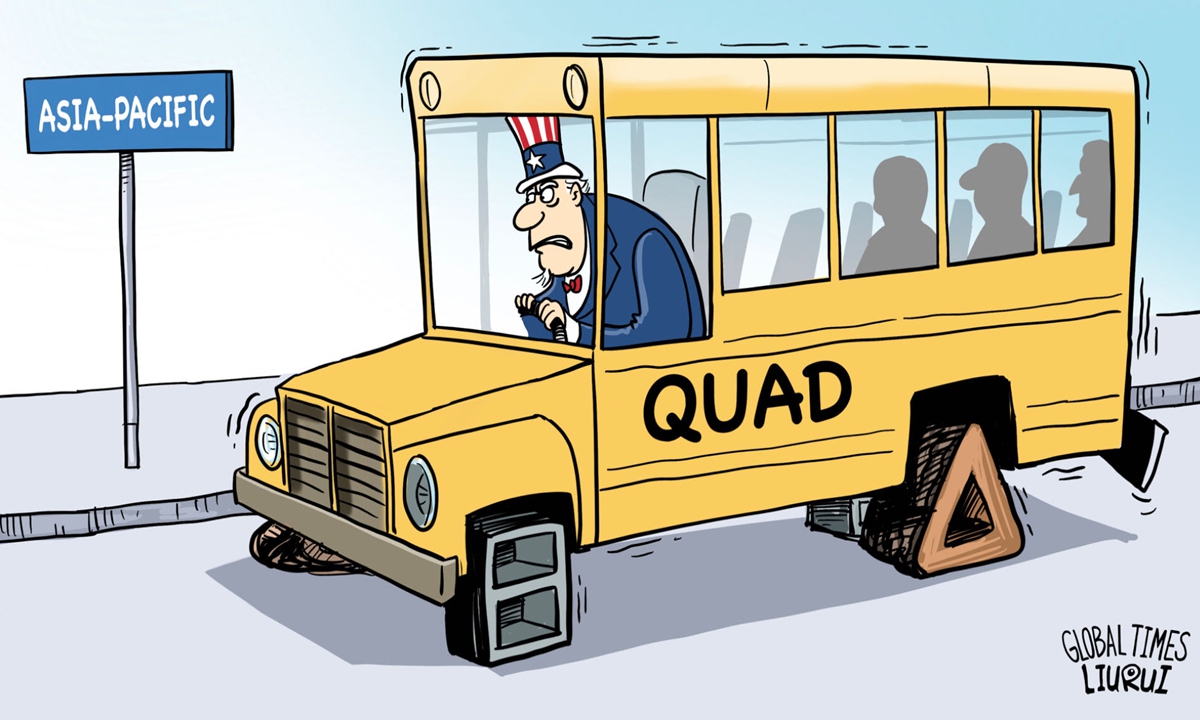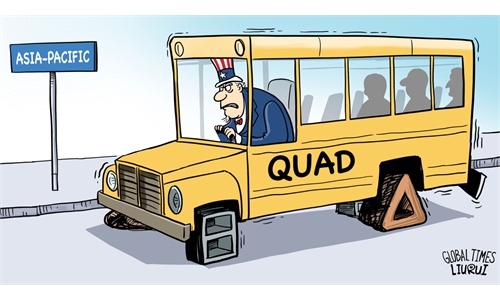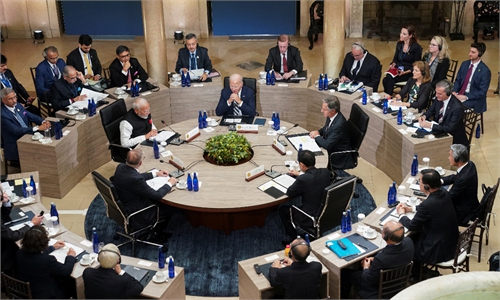
Head to nowhere. Illustration: Liu Rui/GT
On Saturday local time, US President Joe Biden hosted his second and final Quad leaders' summit in his hometown of Wilmington, Delaware, and issued "The Wilmington Declaration" - joint statement from the leaders of Australia, India, Japan and the US. As one of the key political legacies from the Donald Trump administration, the Quad continues to struggle for relevance under Biden as the US seeks to assert its so-called leadership in the Asia-Pacific region. However, the mechanism's significance and role in these countries' foreign strategies are diminishing, while its negative impact on regional dynamics is increasingly pronounced, leading to reduced acceptance from a broader array of regional countries.From the text of The Wilmington Declaration, the Quad agenda remains overly broad, with many plans being more aspirational than actionable, lacking clear timelines and road maps, resulting in significant uncertainty and low feasibility. This is precisely the fundamental characteristic of the Quad. Currently, the Quad primarily serves as a collaborative mechanism based on the willingness of its member countries, rather than treaties, with very limited activities that can be coordinated among the four members. Most activities are conducted bilaterally by specific member states, particularly among the US and its two allies, Japan and Australia. The US positions its policy actions in the Asia-Pacific as part of the Quad, which serves to exert pressure on the other three member countries - particularly India, which is often seen as indecisive - to align more closely with US interests and to refrain from actions that could negatively impact the Quad's collective goals.
For the vast majority of regional countries, the Quad's proposed "Indo-Pacific" joint patrols plan is a provocative action. The four countries plan to launch "a first-ever Quad-at-Sea Ship Observer Mission in 2025 to improve interoperability and advance maritime safety, and continue with further missions in future years across the Indo-Pacific." What further operations the Quad may carry out is worthy of concern.
According to the joint statement, the Quad has helped well over two dozen countries access dark vessel maritime domain awareness data, so they can better monitor the activities in their exclusive economic zones (EEZs), including unlawful activity. This means that data from these countries' EEZs has already been accessed by the Quad, and there is a possibility that the group could access even more data in the future. In other words, the Quad can operate without facing challenges within the EEZs of the involved countries.
The Quad seems to position itself as a decision-maker in regional affairs, which essentially interferes in regional matters. The Wilmington Declaration stressed the so-called 2016 Arbitral Award on the South China Sea, attempting to use it as a basis for intervening in South China Sea affairs and pressuring China to make concessions on its existing policy claims.
The Quad should focus more on the concerns of regional countries, especially those opposing its disruptive role; it should not continue to be a destabilizing factor in the region. Quad members are all comprehensive strategic partners of ASEAN. Yet, some of their actions have significantly undermined their credibility with ASEAN countries. The US-led Indo-Pacific Economic Framework (IPEF) seems to be a fragile structure that appears impressive but lacks substantive content, making it less operational and unable to meaningfully increase trade among member states. India's firm withdrawal from the IPEF at the last moment not only lost the most critical adhesive for cooperation between both sides but also nearly eliminated ASEAN's expectations of India.
The Quad attempts to express its expansionist ambitions through cooperative language, seeking to dominate regional affairs across multiple domains. However, in recent years, the four countries have been less vocal about the "Indo-Pacific Strategy." For them, this strategy seems to have been unsuccessful, with little to commend in terms of its achievements. The Quad is facing its most critical moment since its establishment; creating more uncertainty in the region does not justify its existence.
For China, the Quad summit is just another farce, but it is essential to take appropriate measures to prevent these countries from harming China's national interests and reputation. China will, of course, work with a broader range of regional countries to mitigate the potential harm caused by the Quad's disruptive policies. There are reasons to believe that as long as regional countries maintain the bottom line of national sovereignty and security, the Quad's aggressive rhetoric will struggle to inflict substantial damage, making the group's relevance questionable. Consequently, the Quad will find it difficult to continue being a source of turmoil in the region.
The author is a research fellow at Shanghai Institutes for International Studies. opinion@globaltimes.com.cn


